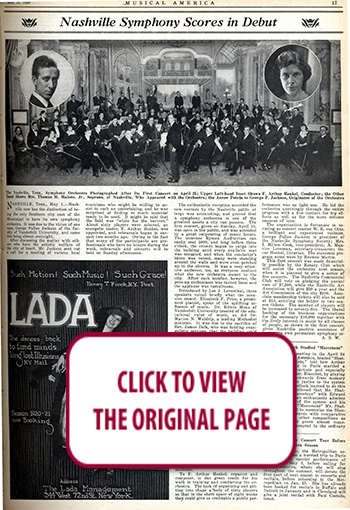 100 YEARS AGO IN MUSICAL AMERICA (337)
100 YEARS AGO IN MUSICAL AMERICA (337)
May 15, 1920
Page 17
Nashville Symphony Scores in Debut
NASHVILLE, Tenn., May 1. —Nashville now has the distinction of being the only Southern city east of the Mississippi to have its own symphony orchestra. It was due to the vision of one man, George Pullen Jackson of the faculty of Vanderbilt University, and came into being almost overnight.
After discussing the matter with others who have the artistic welfare of the city at heart, Mr. Jackson sent out a call for a meeting of various local musicians who might be willing to assist in such an undertaking, and he was surprised at finding so much material ready to be used. It might be said that the field was “white for the harvest.” About sixty players were selected, an energetic leader, F. Arthur Henkel, was appointed, and rehearsals began in earnest two months ago. Owing to the fact that many of the participants are professionals who have no leisure during the week, rehearsals and concerts will be held on Sunday afternoons.
The enthusiastic reception accorded the new venture by the Nashville public at large was astonishing, and proved that a symphony orchestra is one of the greatest assets a city can possess. The first concert, given on Sunday, April 25, was open to .the public, and was attended by a great outpouring of music lovers. The immense Ryman Auditorium can easily seat 5000, and long before three o’clock, the crowds began to surge into the building until every available seat was occupied, and when the conductor’s bâton was raised, many were standing around the walls and were even perched up in the alcoves. It was a very attentive audience, too, as everyone realized what the new orchestra meant to the city. After each number, however, the pent-up enthusiasm was turned loose and the applause was tumultuous.
Introduced by Lee J. Loventhal, three speakers voiced briefly what the occasion meant. Elizabeth F. Price, a prominent pianist, spoke of the uplifting influence of music. Dr. Edwin Mims of Vanderbilt University treated of the educational value of music, as did Dr. Marion N. Waldrip, a leading Methodist minister. It was due to the sacrifice of Rev. James Delk, who was holding evangelistic services, that the building could ·be obtained for the concert.
Open With New Work
The program opened with Bruno Oscar Klein’s joyous “Festival Echoes,” admirably orchestrated by Christian Henkel of Cincinnati, father of the conductor, receiving here its first public performance. The Overture to Weber’s “Oberon” proved the mettle of the orchestra, and its difficulties of horn and string were surmounted in fine style. Bizet’s “L’Arlesienne,” Suite No. 1, with its impressive contrasts, was much enjoyed, as was the lovely Andante Cantabile from Tchaikovsky’s String Quartet. The last work, “March and Procession of Bacchus,” from Delibes’s ballet, “Sylvia,” was played with the spirit and had the essential quality of revelry.
The soloist for the afternoon was the popular local soprano, Mrs. Thomas H. Malone, Jr., who received her musical training in New York. Her voice has a lovely sympathetic quality, and the “Jewel Song,” from “Faust,” was brilliantly sung. Again in the Dell’ Acqua “Villanelle” she displayed unusual breath control and smoothness of phrasing, the coloratura passages being delivered with accuracy of intonation and airy lightness. “The Last Rose of Summer” was given as an encore to the delight of the audience.
To F. Arthur Henkel, organist and composer, is due great credit for his work in training and conducting the orchestra. The task of organizing and getting into shape a body of sixty players so that in the short space of eight weeks they could give so creditable a public performance was no light one. He led the orchestra unerringly through the entire program with a fine instinct for big effects as well as for the more delicate nuances of tone.
The organization is fortunate in securing as concert master W. E. von Otto, a brilliant and experienced violinist. George Pullen Jackson is president of the Nashville Symphony Society; Mrs. I. Milton Cook, vice-president; A. Maurice Loveman, secretary-treasurer; Oscar Henkel, librarian. The elaborate program notes were by Browne Martin.
This first concert was made financially possible by the Rotary Club which will assist the orchestra next season, when it is planned to give a series of fine concerts. The Nashville Commercial Club will vote on pledging the annual sum of $7,500, while the Nashville Art Association will give $50 a year and the Art Commission of the city $200. Associate membership tickets will also be sold at $10, entitling the holder to two season tickets. The number of players will be increased to seventy-five. The liberal backing of the business organizations for the necessary $10,000 together with the lively interest in music by all classes of people, as shown in the first concert, gives Nashville positive assurance of having its own permanent symphony orchestra. —A. S. W.




 RENT A PHOTO
RENT A PHOTO





